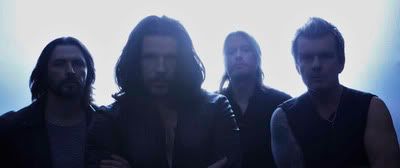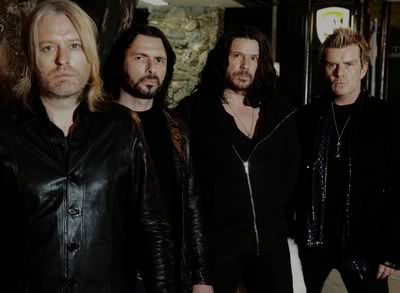THE CULT - Choice Of Weapon: Hard Rock With An Underpinning Of JOY DIVISION
May 29, 2012, 12 years ago
Well, Ian Astbury figured he’d had it with making conventional albums, and in actuality, the whole Capsule EP concept was pretty cool. Fortunate for us however, Ian, along with Chris Wyse, John Tempesta, and right hand-man Billy Duffy, decided their love for the full-length ruled over all disgust with the business, and have returned with a corker of a new record called Choice Of Weapon, which is no less than one of the band’s most accessible and forward-lunging records ever, yet still grand, epic, textural, and, as has been the case at least ever since the self-titled from ‘94, intellectually rich.

“So I think that’s the unique thing to THE CULT,” continues Astbury, “where we came at that period where everything is possible, no rules. Anyway, so after that, we kind of, pretty much myself, I was disillusioned with –I hate to use this word – the industry. It’s not an industry anymore. It’s not a… what industry? When I think of industry, I think of factories. There is no industry. It’s something else. So you start something else. Personally I guess we were going to do it ourselves, and I thought the idea was people have such a short attention span, so how do you capitalize? People are giving away their music for free. It’s like a fist fight. People are afraid, everybody’s standing there, what are we doing? Should we do it this way, should we give it away for free, what do we charge, what do we do? So I kind of thought, you know what? Let’s do something we can handle. Two songs every three months, with a film, visual element, and then do two live songs, and we’ll do it in all formats, every three months. Then we’ll kill it, rotate, and we’ll just keep that rolling out. I thought that would be a really great way of getting music out, keeping our fans engaged, and keeping everything fresh, keeping us engaged.”
“And so we brought in Chris Goss,” says Ian, Goss being one of rock’s finest, under-the-radar producers, but more impertinently, master of MASTERS OF REALITY, America’s Led Zeppelin, since the break-up of CACTUS. “We’ve been talking about working with Chris Goss for quite a while, so this was the opportune time to work with Goss. So we started with Chris, we came out with the first two Capsules, and because of that we attracted a lot of attention, not only from our audience, but from labels, who are going, this is really good, this is very, very strong, we want this.”
“So I was like the last one – I capitulated at the very end. Pretty much everybody was looking at me. My manager, Billy… ‘It’s up to you, kid.’ Okay, fine. Let’s go make a fully-fledged album. But this time around, we wanted to make sure that when we went into the studio, it was going to be fully realized. Songs will get the chance to really see their way to conclusion. It wasn’t crammed into a 15 day recording session. So we spread it out over the period of a year. It was done pretty much spread out. We started probably doing demos for it March last year, and yeah, we didn’t deliver it until about January, I think. And it was late (laughs). So it sorta got pushed back a bit.”

Pushed and pulled, because a true subtext to the record has to include the actual, extended production story, with credit on the album going to Chris Goss… and Bob Rock! Listen to Choice Of Weapon, and one can only imagine that a lot of the great music on it was touched my the magic shaman man hand of Goss, but that the album’s accessibility, and pretty played-straight, actually, production sound… well, that’s gotta be Bob Rock. Turns out that’s kinda how it went down, with the result being a bunch of the band’s greatest songs rendered sonically conservative and efficient, no peaks and valleys, like Sonic Temple, the band’s album of bloat.
“Working with Goss,” explains Ian, “initially, helped break a lot our bad habits we kind of got as a group, as an entity. He kinda came in and I went like, some of this stuff is not relevant. You gotta lose some of the arrangement bad habits. He really started to break things up, longer passages, different perspectives, and he really did an incredible, incredible amount of work on that. After that we needed to finesse it; we needed to finish it. And we had exhausted… we kind of exhausted the relationship with Chris, in that we got every single grain we could have out of him, and it was a lot of work. It’s difficult to be a fly on the wall and explain what it is, but sometimes you’re routining songs 30, 40 times. You’re playing them over and over and over again, and changing… You know, you keep looking at it, as opposed to like sitting there just listening to the same take over and over again. That’s not how you get it. You get it by playing it. You’ve got to play these things.”What would’ve the production sounded like had it stopped with Chris?
“I think it would have been probably more ethereal, slightly more esoteric. I mean, it would be a European cinema, as opposed to, you know, North American cinema. It’s just those nuances are in there. And I’m completely cool with that. That’s cool. But then again, there’s always this thing where you want to take it further. You kind of want to finesse it and bring it in slightly, bring the focuses in slightly more. An analogy I use is kind of off-Broadway, maybe European – it had that sentiment to it. Working with Bob, who is incredible at finessing and has just got an incredible ear, he’s a brilliant engineer, and he knows how to achieve a balance. He retained all those elements that Chris had, but then just kind of amplified them in some way. He changed some of the arrangements. He worked on some of the performances, came in and worked on some very important parts. ‘Life > Death’ came out of the cinema noir, kind of sound, into very much like a beautiful scene out of a great North American director like… I like to use film analogies, because people get visual on it, so it’s a good way of describing it. So Bob really came in and finessed this record and really helped us to refine it, and then really, kind of clarified what the record was. So his input was essential. Both of them were essential.”Choice Of Weapon is a pretty hard rockin’ record though, and a lot of that comes down to Billy Duffy, the riff-master of the band. Hard guy to get your head ‘round in terms of a style. Duffy has many styles, moods, shades, and he certainly doesn’t stand out as much as guys like BRIAN MAY, Eddie, Yngwie, ROBERT FRIPP, STEVE HOWE, ANDY SUMMERS… guys WAY recognizable. In fact, the only guy I could see fashioning stuff like Billy and playing it with the panache of Billy is SLASH.
“I think when Billy plays the guitar, you know it’s Billy,” defends Ian. “You know, I certainly can pick him out. I think he’s got a very distinct sound. You know, one of his things was, he was working with JC-120s, you know, older amps, Marshalls and whatnot. There’s something about that – that’s the postmodern mixed with the traditional. And then bringing modern effects, pedals, and that kind of diversified his sound. He’s got a slightly… you know, you go to the Gretsch White Falcon, which is a huge thing for him. And that’s part of his sound. So he’s definitely explored… he’s really taken his time to craft his sound, no doubt. And that’s what’s great about working with someone like Chris Goss or Bob Rock, because they’re guitar players.”
When The Cult went shockingly Electric in 1987, Ian says they could have easily gone even more “post-punk” than Love or the earlier raw and tribal material. That’s where being saved by rock came in, most fervently, Zeppelin and THE DOORS.
“Billy plays riffs, but I mean, if you listen to our records, you’ll see that there is a rhythmic underpinning that bands like REM and THE SMITHS never had,” explains Astbury. “Our rhythm end moves, and that’s me. I pushed the rhythm end. It’s gotta swing, it’s gotta have that, and maybe that’s something we do have in common with Led Zeppelin and the ROLLING STONES and all those bands. Because it’s gotta move from the waist down. The Smiths and REM, with all due respect, doesn’t move from the waist down. It moves from the neck up. And it doesn’t really hit that chakra (laughs), you know. It doesn’t really hit the reproductive organs the way that great music should. And you know, in terms of hard rock, yeah, plenty of riffs, but you listen to the textural elements in our records. Even this album has a lot of stuff that… ‘Life > Death’ is a chord-driven piece; it’s a singer-songwriter piece. So there’s different disciplines. ‘Elemental Light’ isn’t really riffy. I mean, ‘Honey From A Knife’ is. ‘The Wolf’ is riff central. But ‘The Wolf’ is like a car crash between the Rolling Stones and Black Sabbath. I mean, those are the elements. ‘The Wolf’ is really like an homage to Sabbath, in some ways. There’s… You can hear the influences. I mean, there are some direct influences, sitting there, and you go, what should it be like? And you go directly to the archetype (laughs). ‘It’s gotta sound like this.’ Of course it never will, because it’s going to go through your filter. We reach for that stuff because we know it’s not going to sound identikit – there’s no way you can make a pastiche of that.”










